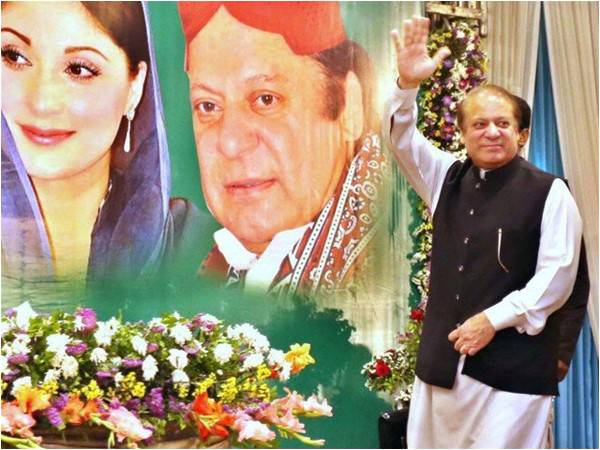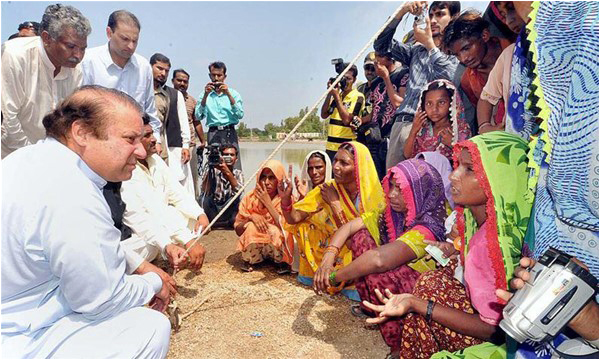
Prime Minister Nawaz Sharif has been extraordinarily respectful of the territorial boundaries of other parties since the 2013 elections. He stayed away from manipulating a coalition government in Khyber Pakhtunkhwa after the Pakistan Tehreek-e-Insaaf fell marginally short of a simple majority. He allowed the National Party to take the front seat in the Balochistan government during the initial years, and has hitherto remained absent from Sindh’s politics to avoid annoying the Pakistan People’s Party—even allowing Dr Ishrat Ul Ebad to continue serving as governor until recently. It is thus conspicuous to see his sudden interest in urban Sindh, with frequent visits and offers of development packages.
The Pakistan Muslim League-Nawaz is undoubtedly pouncing at the opportunity that has opened up in urban Sindh with the disintegration of the Muttahida Qaumi Movement and the changing demographics of Karachi. The prime minister may have reluctantly allowed the deep state to banish Altaf Hussain from the city’s power scene, but he is not shy to take advantage of the results. Indeed, he waited until it was certain that the decision to keep Altaf at bay was institutional rather than personal. Unlike as it was in the 1990s, a change of guard in the military leadership now has not had an impact on the role of the deep state in Karachi’s politics. Assured that the MQM (any faction) is likely to be too weak to defend its turf, the PML-N has decided to move ahead to fill the political vacuum.

The surprising news here is not that the PML-N is entering Karachi’s political space, but that no other political party is even trying to benefit from the seemingly fertile political landscape of urban Sindh. This speaks volumes of the immaturity of the PTI and a lack of vision by the PPP— the other two mainstream parties that should join the race to take the city. Another surprising element is the dexterity with which the PML-N is constructing its narrative around secular ethos and economic development. This demonstrates that the party understands the voters of urban Sindh and is ready to meet them where they are. The prime minister’s recent message of religious harmony at Holi and repeated overtures to the city’s business community will go a long way to create a positive image of his party among many residents of the city.
A message that calls the citizens to vote for development, peace, and security instead of ethnic or religious discord will certainly attract attention. Couple this with a lack of other viable options due to a disintegrating MQM, and the PML-N might have a real stake in Karachi’s politics. Whether the PML-N can make substantial inroads in Sindh is difficult to predict, but it certainly seems to be headed in the right direction. In any case, this is a minimal risk gamble. If the PML-N manages to win some seats for itself, great! If not, then the prime minister will be seen as doing his job by catering to an important part of the country.
Even though Altaf Hussain still enjoys staunch support within the low-income Urdu-speaking communities of urban Sindh, his power base is continuously shrinking due to migrations from other parts of the country that have only accelerated in the last decade. The results of the ongoing census are likely to hit Sindh’s politics the hardest. If predictions are correct, the census will show a population shift from rural to urban Sindh and a significant decrease in the percentage of Urdu-speaking people in Karachi. As a result, the PPP’s control over the provincial government will weaken and the MQM’s potential seats in parliament will decline. The census will also result in the redrawing of boundaries for electoral constituencies, which will undo the gerrymandering enjoyed by the MQM since the Musharraf years.
In short, a divided MQM vote coupled with increasing ethnic diversity and the addition of new parliamentary seats offers a rare opportunity in urban Sindh, which only the PML-N seems to be aware of. Having said that, taking advantage of this opportunity will not be easy. Karachi is a difficult city with complex intersections of ethnicity, religion, and class. In addition to appealing to people’s’ desires for security and development, the PML-N will have to address the socio-political complexities that are particular to urban Sindh.
If the PML-N is serious about taking Karachi, it will have to bend its politics and allow grassroots workers to control the party’s local leadership. The people of urban Sindh have long been used to self-rule through the MQM. They have tasted self-governance for enough decades that they are not likely to accept leadership from the moneyed class. Their leadership—from counsellors to assembly members—will have to emerge from the citizens themselves, who live and work in the communities that elect them. Instead of falling for moneyed influentials like Raheela Magsi or Capt. Haleem Siddiqui, the PML-N should erect an institutional structure based on a rotation of party workers and cadres into leadership positions.
The PML-N has a plausible shot at expanding itself out of its secure power base in the Punjab to urban Sindh. The party already enjoys grassroots support in Lyari due to a decrease in violence in the area, which it may be able to cash in on in the next general elections. However, to get the coveted prize of Karachi and possibly the Sindh government, the party will have to devolve power to the urban poor and open opportunities for political representation and space for them. The results will not be disappointing.
Obed Pasha is lecturer of Public Policy at the University of Massachusetts, Amherst. He can be reached at obedpasha@gmail.com or @ramblingsufi
The Pakistan Muslim League-Nawaz is undoubtedly pouncing at the opportunity that has opened up in urban Sindh with the disintegration of the Muttahida Qaumi Movement and the changing demographics of Karachi. The prime minister may have reluctantly allowed the deep state to banish Altaf Hussain from the city’s power scene, but he is not shy to take advantage of the results. Indeed, he waited until it was certain that the decision to keep Altaf at bay was institutional rather than personal. Unlike as it was in the 1990s, a change of guard in the military leadership now has not had an impact on the role of the deep state in Karachi’s politics. Assured that the MQM (any faction) is likely to be too weak to defend its turf, the PML-N has decided to move ahead to fill the political vacuum.

The surprising news here is not that the PML-N is entering Karachi’s political space, but that no other political party is even trying to benefit from the seemingly fertile political landscape of urban Sindh. This speaks volumes of the immaturity of the PTI and a lack of vision by the PPP— the other two mainstream parties that should join the race to take the city. Another surprising element is the dexterity with which the PML-N is constructing its narrative around secular ethos and economic development. This demonstrates that the party understands the voters of urban Sindh and is ready to meet them where they are. The prime minister’s recent message of religious harmony at Holi and repeated overtures to the city’s business community will go a long way to create a positive image of his party among many residents of the city.
A message that calls the citizens to vote for development, peace, and security instead of ethnic or religious discord will certainly attract attention. Couple this with a lack of other viable options due to a disintegrating MQM, and the PML-N might have a real stake in Karachi’s politics. Whether the PML-N can make substantial inroads in Sindh is difficult to predict, but it certainly seems to be headed in the right direction. In any case, this is a minimal risk gamble. If the PML-N manages to win some seats for itself, great! If not, then the prime minister will be seen as doing his job by catering to an important part of the country.
Even though Altaf Hussain still enjoys staunch support within the low-income Urdu-speaking communities of urban Sindh, his power base is continuously shrinking due to migrations from other parts of the country that have only accelerated in the last decade. The results of the ongoing census are likely to hit Sindh’s politics the hardest. If predictions are correct, the census will show a population shift from rural to urban Sindh and a significant decrease in the percentage of Urdu-speaking people in Karachi. As a result, the PPP’s control over the provincial government will weaken and the MQM’s potential seats in parliament will decline. The census will also result in the redrawing of boundaries for electoral constituencies, which will undo the gerrymandering enjoyed by the MQM since the Musharraf years.
The results of the ongoing census are likely to hit Sindh's politics the hardest. If predictions are correct, the census will show a population shift from rural to urban Sindh and a significant decrease in the percentage of Urdu-speaking people in Karachi
In short, a divided MQM vote coupled with increasing ethnic diversity and the addition of new parliamentary seats offers a rare opportunity in urban Sindh, which only the PML-N seems to be aware of. Having said that, taking advantage of this opportunity will not be easy. Karachi is a difficult city with complex intersections of ethnicity, religion, and class. In addition to appealing to people’s’ desires for security and development, the PML-N will have to address the socio-political complexities that are particular to urban Sindh.
If the PML-N is serious about taking Karachi, it will have to bend its politics and allow grassroots workers to control the party’s local leadership. The people of urban Sindh have long been used to self-rule through the MQM. They have tasted self-governance for enough decades that they are not likely to accept leadership from the moneyed class. Their leadership—from counsellors to assembly members—will have to emerge from the citizens themselves, who live and work in the communities that elect them. Instead of falling for moneyed influentials like Raheela Magsi or Capt. Haleem Siddiqui, the PML-N should erect an institutional structure based on a rotation of party workers and cadres into leadership positions.
The PML-N has a plausible shot at expanding itself out of its secure power base in the Punjab to urban Sindh. The party already enjoys grassroots support in Lyari due to a decrease in violence in the area, which it may be able to cash in on in the next general elections. However, to get the coveted prize of Karachi and possibly the Sindh government, the party will have to devolve power to the urban poor and open opportunities for political representation and space for them. The results will not be disappointing.
Obed Pasha is lecturer of Public Policy at the University of Massachusetts, Amherst. He can be reached at obedpasha@gmail.com or @ramblingsufi

